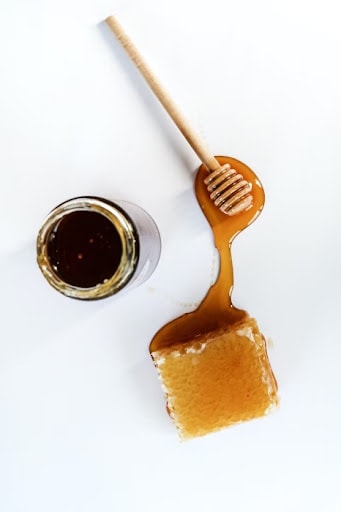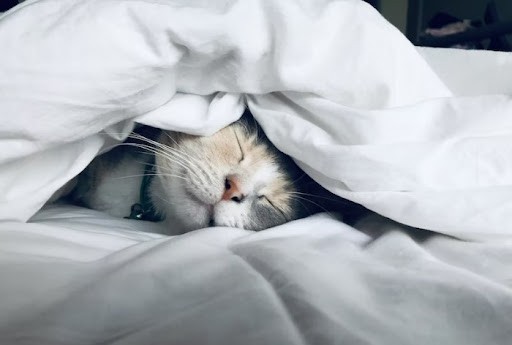If you’re like many folks struggling with sleep, honey before bed can sometimes be a sweet addition to your nighttime routine (pun intended). It’s pretty straightforward: you pop some honey in your mouth for a good night’s sleep.
Let’s discuss how this works and if you should consider this.
How does honey help you sleep?
Here’s how it works: Honey contains carbohydrates. So eating honey at bedtime, leads to a slow release of nutrients into your bloodstream
Most importantly, this glucose goes into your brain to power your neurons.
Essentially, good sleep depends on properly functioning neurons.
When your neurons get glucose, this helps the normal neurological process for good sleep.
Your body consumes glycogen from your liver and this “sugar store” runs low in the middle of the night. Thus, when your liver runs out, then your neurons don’t have the fuel they need and this causes you to wake up.

Should it be raw honey?
Raw honey is the ideal choice here. Raw honey contains enzymes that can help improve digestion allowing more glucose to reach your brain and body.
And, one study found it can ward off upper respiratory tract infections in children.
How much should you have?
A small amount of honey like a teaspoon or two of honey is enough of an energy boost for a restful night’s sleep. For those counting, that’s a paltry 6-12 grams of sugar.

Warm Milk?
Another version of getting blood glucose is warm milk or a milk honey mixture. (Thinking of these two ingredients together is… interesting)
Warm milk works because the mixture of lactose, protein, and fat provide a steady release of nutrients to your central nervous system at night. (And warmer milk is absorbed faster in case you were wondering…)
And, the protein here is rich in tryptophan. Tryptophan is an amino acid used in the synthesis of serotonin. Hence, when you spike insulin and eat tryptophan, this could lead to more serotonin and, ultimately, more melatonin at night.

Researchers found clear evidence that the group drinking this wonderful concoction experienced improved sleep as compared to the control group.
Adding honey into the milk can enhance the effect, but you may start to run into an issue that is worse (and less obvious) than spilling this drink in your bed.
The effect of elevated blood glucose on sleep
So, yes, honey and/or milk helps you sleep, but there is a consequence.
When you consume honey (or milk) your blood sugar goes up. When blood sugar is elevated, then insulin goes up.
When you are raising insulin levels that ultimately lower your secretion of melatonin at night (melatonin is the “hormone” that helps you sleep at night).
As a result, your natural sleep gets worse long term. To minimize this effect, you’d want to have your sleep honey hours before bed. However, this greatly reduces its effectiveness.
Sleep quality – an underlying issue
Ideally, at night, your neurons use other fuel sources like ketones, fatty acids, and lactate.
However, when your sleep starts to fall apart, then your neurons can’t handle those fuels.
So, if honey can help you sleep, then that means your neurons’ mitochondria are falling apart.
As a result, then your neurons can need glucose as an extra fuel source.
You may get better sleep from honey, but that means you have an underlying issue in your sleep.

What are the benefits of honey for sleep?
Now, don’t get me wrong. Using honey can help you fall asleep more easily. And, honey can be used as a short-term measure or as a bridge to repairing your sleep issues.
Overall, the health benefits of getting sleep outweigh the negative effects of honey. But, if you need honey to relax and rest, then you’ll never get to a state of optimal health in your body or brain.
Why doesn’t honey always work for sleep?
If honey isn’t helping you sleep, then you’re in some serious metabolic trouble.
Essentially sugar is the easiest fuel for your neurons to burn.
When your neurons can’t burn sugar as well; then they aren’t burning ANY fuel very well. This also may be why you have brain fog during the day.
The other option is that you may not have metabolic issues with sleep. Instead you could have issues with your hormones (like cortisol being high at the wrong time) or with your nervous system (you’re “tired and wired” at night).
Either way, you need to start asking yourself “why do my neurons need to rely on honey in the first place?”
What are alternatives to honey before bed?
The two top focuses you need to have on getting to the core of your sleep issues are your mitochondria and your circadian rhythms.
Check out our masterclass in the pop-up in the corner of our site or at the top of our website to learn more about these two critical components of your sleep!

Written By: Dylan Petkus, MD, MPH, MS
Dr. Dylan Petkus is on a mission to help people overcome their health issues like sleep apnea so they are not limited by their condition or trapped by options that don’t provide full resolution.
He earned his Master’s of Science in Physiology at Pennsylvania State University where he was awarded a research fellowship and was a peer-reviewed published author. He went on to earn both his Master’s in Public Health and Medical Degree from the University of Miami Miller School of Medicine. Thereafter, he specialized in Family Medicine to help patients on the front-line of chronic disease.
Having overcome his own health challenges, including sleep apnea, he strives to help empower others to live fuller, healthier lives.
